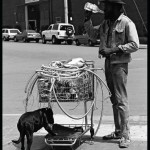Tusken said
Substantially, what has changed is our role now is to be a resource in the communit . We work very closely with Deb Holman, (Duluth’s) homeless outreach worker. We now have two embedded (with police officers) social workers who help people get services they need. (Instead of, ‘Move along’), we’re saying, ‘Here are all the resources available to you,’ everything from where you can get meals, shelter, housing, and legal support to what to do if you’re in a violent-partner relationship. …
“Today, we look to give (those experiencing homelessness) referrals and help,” the chief said, rather than the brush-offs and citations of yesterday.
The new approach is producing a more positive Duluth, the city’s human rights officer, Carl Crawford, said:
The biggest thing is that the police department and the city and our homeless coalition are talking to each other now. They’re no longer talking at each other. And that’s a big shift, too. Homelessness is something that happens all over the country. It’s different here because of the extreme temperatures. Here, you’re talking life safety, what’s happening in the extreme cold. Police underwent unbiased training, and I think that has really shed a different light on things. How do we see people with dignity? … As a city we are definitely talking and listening and working on this together. We know there are insights from all sides of the table. “Really, how hardhearted and truly cold would one have to be to stand opposed?”. “Supporting dignity for all doesn’t mean giving up any expectation of personal responsibility by all. … Ensuring human rights is a city responsibility. Specifically including those who don’t have homes can be seen as a right thing to do. They’re people who too often are overlooked, forgotten.”
There’s also evidence of changes for the better in addition to the shifts in attitude and approach. Heated public restrooms are being opened by the city earlier in the mornings and left open longer into the evenings. Also, in December, the city added six portable toilets at strategic points at the center of the city.
At the same time, a grassroots coalition of homeless advocates, city leaders, and others has been working since the fall of 2013 to draft a Homeless Person’s Bill of Rights, a guiding document to ensure safety and basic human rights for those out in the cold.
A number of its details still demand to be addressed, but with laws in place to handle most concerns. The News Tribune opined in March:
Really, how hardhearted and truly cold would one have to be to stand opposed?Supporting dignity for all doesn’t mean giving up any expectation of personal responsibility by all. … Ensuring human rights is a city responsibility. Specifically including those who don’t have homes can be seen as a right thing to do. They’re people who too often are overlooked, forgotten.
Although, increasingly, not so much, not with attitudes shifting and approaches to homelessness changing here in Duluth and across the nation.
Our focus, always, can be making sure there are safe places where people can go and adequate housing. But while we’re working on that, there is nothing wrong with also doing what’s possible to ensure everyone is treated humanely — and as humans.
© Humane Exposures / Susan Madden Lankford










